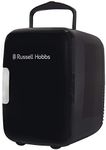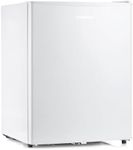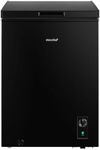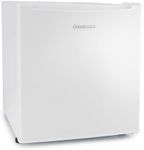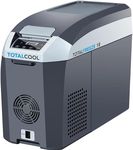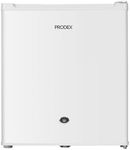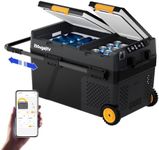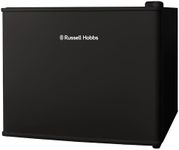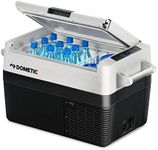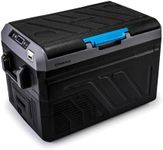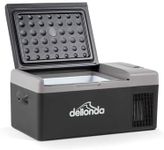Buying Guide for the Best Portable Freezers
When choosing a portable freezer, it's important to consider your specific needs and how you plan to use the freezer. Whether you're going on a camping trip, need extra storage for groceries, or want to keep drinks cold at a tailgate, the right portable freezer can make a big difference. Here are some key specifications to consider and how to navigate them to find the best fit for you.CapacityCapacity refers to the amount of space inside the freezer, usually measured in liters or quarts. This is important because it determines how much food or drink you can store. Small capacity freezers (up to 20 liters) are great for short trips or single-person use. Medium capacity (20-40 liters) is suitable for small families or longer trips. Large capacity (over 40 liters) is ideal for extended trips or larger groups. Consider how much you need to store and choose a capacity that fits your needs.
Power SourcePortable freezers can be powered in different ways, including AC (home outlet), DC (car outlet), and sometimes even solar power. This is important because it affects where and how you can use the freezer. If you plan to use it in your car, make sure it has a DC power option. For home use, an AC power option is necessary. Some models offer dual power options, which provide more flexibility. Choose a power source that matches your intended use.
Temperature RangeThe temperature range indicates how cold the freezer can get. This is important for ensuring your food stays frozen or chilled as needed. Some freezers can go as low as -20°C (-4°F), which is suitable for freezing food. Others may only cool to around 0°C (32°F), which is good for keeping drinks and perishables cold. Consider what you need to store and choose a freezer with an appropriate temperature range.
Energy EfficiencyEnergy efficiency refers to how much power the freezer uses to maintain its temperature. This is important for conserving battery life if you're using a portable power source and for reducing electricity costs at home. Look for models with energy-saving features like thick insulation and efficient compressors. If you plan to use the freezer for extended periods or in remote locations, energy efficiency becomes even more crucial.
PortabilityPortability includes factors like weight, size, and the presence of handles or wheels. This is important because it affects how easy it is to transport the freezer. Lightweight and compact models are easier to carry and fit into tight spaces, making them ideal for camping or road trips. Larger models with wheels and sturdy handles are better for situations where you need more capacity but still want to move the freezer around. Consider how often and where you will be transporting the freezer and choose a model that suits your mobility needs.
DurabilityDurability refers to how well the freezer can withstand rough handling and harsh conditions. This is important if you plan to use the freezer outdoors or in rugged environments. Look for models with sturdy construction, reinforced corners, and high-quality materials. If you need a freezer for camping, off-roading, or other outdoor activities, durability is a key factor to ensure it lasts through your adventures.
Noise LevelNoise level refers to how loud the freezer is when it's running. This is important if you plan to use the freezer in a quiet environment, like a bedroom or a campsite. Some freezers have quiet compressors that minimize noise, making them more suitable for such settings. If noise is a concern for you, look for models that are specifically designed to operate quietly.
